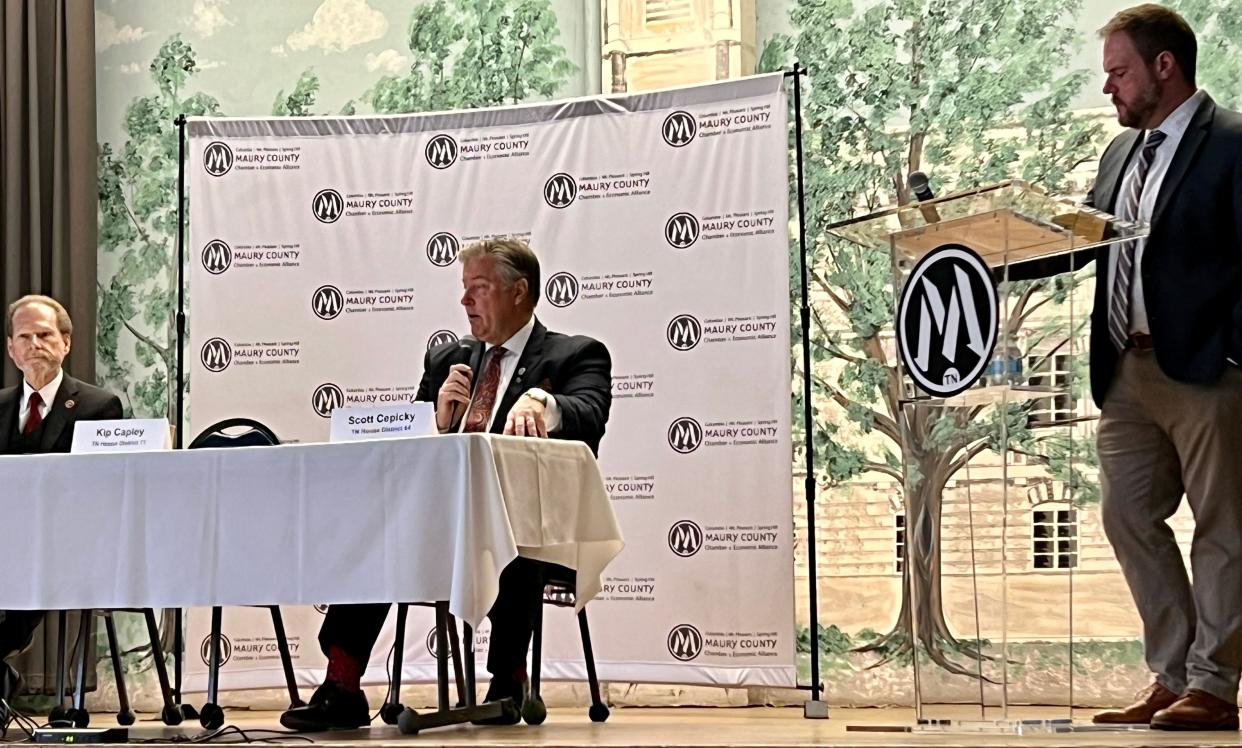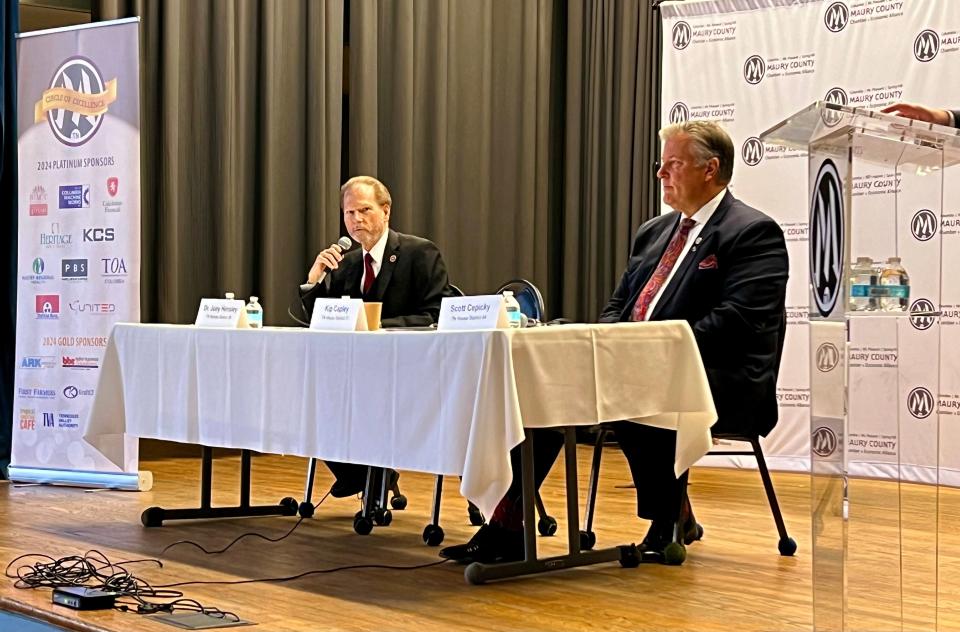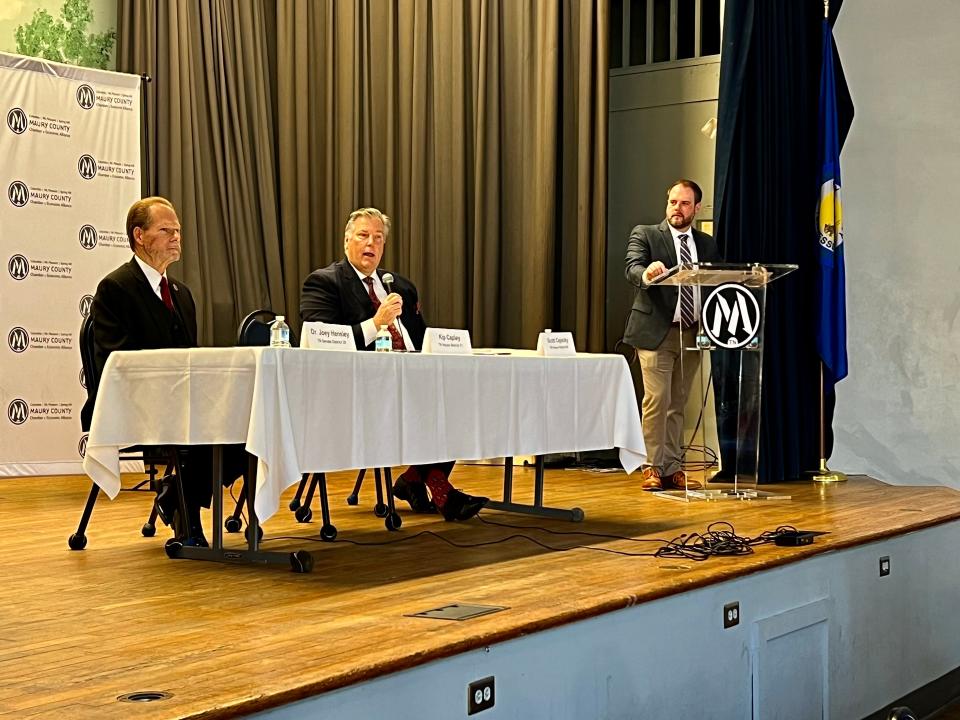Cepicky: 'We are fighting for what's best for Maury County'

- Oops!Something went wrong.Please try again later.
Education and taxes were among the main topics addressed at this year's State Eggs & Issues breakfast.
The annual breakfast, hosted by the Maury County Chamber & Economic Alliance, invites elected officials from the State Capitol to answer questions, speak about certain bills and the overall progress of this year's General Assembly.
This year's panel, which featured State Sen. Joey Hensley, R-Hohenwald, and State Rep. Scott Cepicky, R-Culleoka, and was moderated by Maury Alliance President Wil Evans.
More: Proposed bill to cap property taxes draws opposing views between delegation, commission
More: Maury Co. Commission requests legislature to amend County Powers Relief Act
Taxes, infrastructure and handling growth
With Maury County's continued growth comes the increased need for infrastructure, as well as who foots the bill to pay for it.
Cepicky said there have been progress to address long-term infrastructure needs, such as securing $200 million to widen U.S. Highway 31 in Spring Hill. While other projects, like widening Bear Creek Pike in Columbia, continue to await funding approval.
"We constantly work at finding money that benefits our community," Cepicky said. "For growth, there is a bill I have already presented to allow half of the real estate transfer tax come back to Maury County. The rough numbers would be roughly $7-$8 million a year to help pay for our schools, school growth and maintenance."
There is also a push to allow the county to implement an impact fee for builders on new construction as an amendment to the existing state County Powers Relief Act.
Hensley added that the state's budget for capital projects did not include a large surplus this fiscal year, which has been common over the last few years. While there is enough money to pay for existing needs, some projects will unfortunately have to remain on hold, he said.

"Our revenue estimates have been below what we estimated for our budget," Hensley said. "So we haven't been taking in as much, will have to make up some money, but we are constantly looking for funds for Maury County."
Another piece of legislation is the push to put a 2% cap on annual property tax increases, which both Hensley, Cepicky and Kip Capley, R-Summertown, (who was invited to the talk but not present) said could have a negative impact on Maury County, which remains one of the fastest-growing counties in the state.
"With high growth counties like Maury County, that's going to put a big financial strain on us," Cepicky said. "But this doesn't mean the Maury County Commission cannot come back to the people of Maury County and make their case to raise taxes more than 2%. Then it goes to a referendum of the people, who we work for. It's your ultimate decision because you are the ones who are going to have to pay it."
Education, literacy rates and school vouchers
Last year, the state implemented its new third grade retention law, which was designed to address early education reading and comprehension levels.
After its first year in effect, Cepicky said the retention data shows that Tennessee's literacy rate is currently at 40%, which is a 10% growth over the last two years. And while improvement is a good thing, the numbers are still far below where they should be, he emphasized.
"We are the highest growing state in the country, especially coming out of COVID," Cepicky said. "But still, 40% is not acceptable with 60% of our kids not on the right level. Our literacy in the 8th grade drops to around 22% and in high school it drops into the teens. That's our state right now."

Cepicky added that the declining numbers are why the issue of literacy should be addressed at the forefront, and that in order to advance the students must do the work, with hard data showing that growth is being accomplished.
"Education will solve our problems in our society on the backend," Cepicky said. "This is an epidemic, and it hasn't happened overnight, but we are going to fix it in Tennessee."
Education Freedom Scholarship Act to be debated
The state's education system could also see a big change this year with Gov. Bill Lee's proposed Education Freedom Scholarship Act, which would grant 20,000 school vouchers to qualifying low-income households with homeschool students or those wishing to attend private schools.
However, part of the proposed bill could also grant 10,000 of the vouchers to students regardless of household income, with other concerns regarding a potential decrease in school funding.
"Most students are probably going to stay in public education if we pass a program like this, but we just want to give parents a choice to have the best education for their child," Hensley said. "Parents ultimately have that right, but ultimately like any legislation it will be debated, go through all the committees and we'll just have to see what happens moving forward."
Cepicky added that the House plans to allow private schools to decide whether they want to participate in the program or not if passed.
He also proposed that participating schools would be required to send grades and test results to a third party, who would assess the data from all scholarship recipients. The final data would then be submitted to the State for evaluation.

"We create a level of separation between the government and our private schools and give them the protection they need," Cepicky said. "That information will then be disseminated to us in the House and Senate so we can track the academic progress of these kids going from a public to private school to make sure their academic progress is going in an upward trajectory."
For public schools, Cepicky said he is pushing for legislation to limit testing in grades K-12 to allow more time for teaching, which he said would free up almost 500 hours of instruction.
"There is a teacher who told me he gives his middle schoolers 15 tests a year. That's one every 11 days," Cepicky said.
"All we are doing is confirming for the multiple tests so that the kids don't have time to learn, and we are testing them and getting results that they don't know. You ask any teacher and they'll tell you one thing, 'If you give me the time to teach, I'll get them across the finish line.
"We are fighting for what's best for Maury County."
Jay Powell is a general reporter for The Daily Herald. Get up-to-date news in your inbox by subscribing to The Daily Herald newsletter at www.ColumbiaDailyHerald.com.
This article originally appeared on The Daily Herald: Maury County legislators address growth, taxes and school choice

